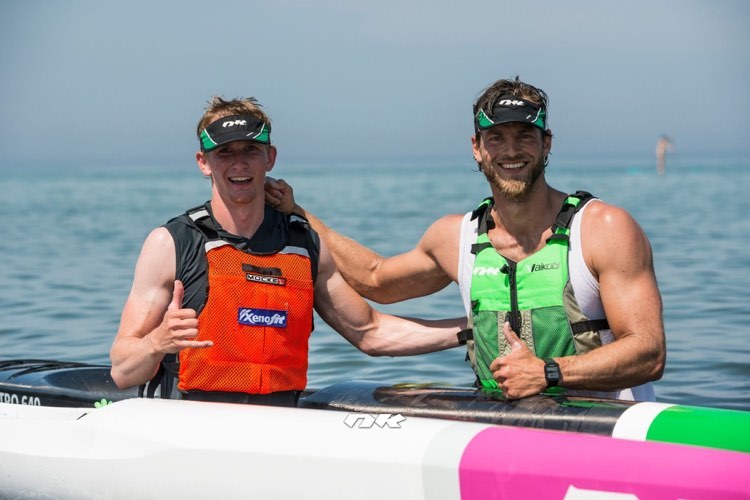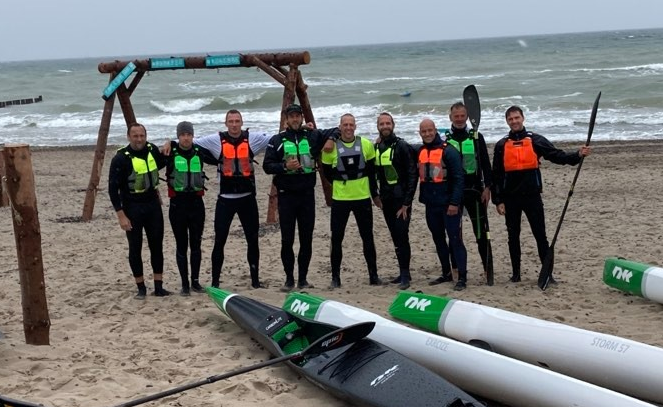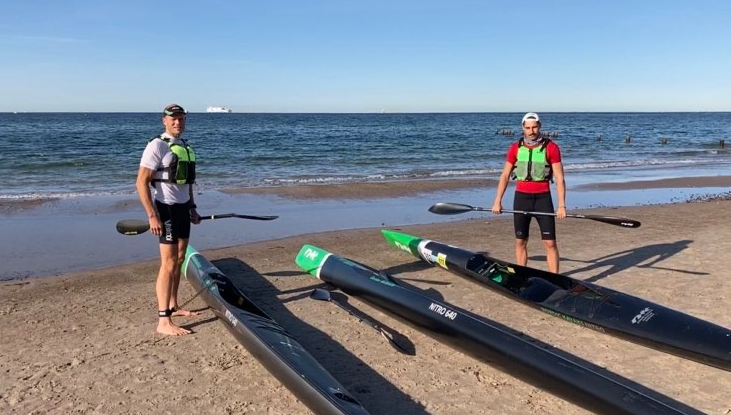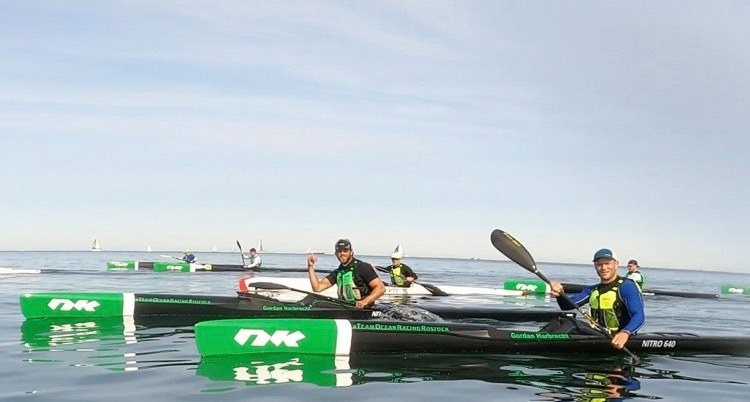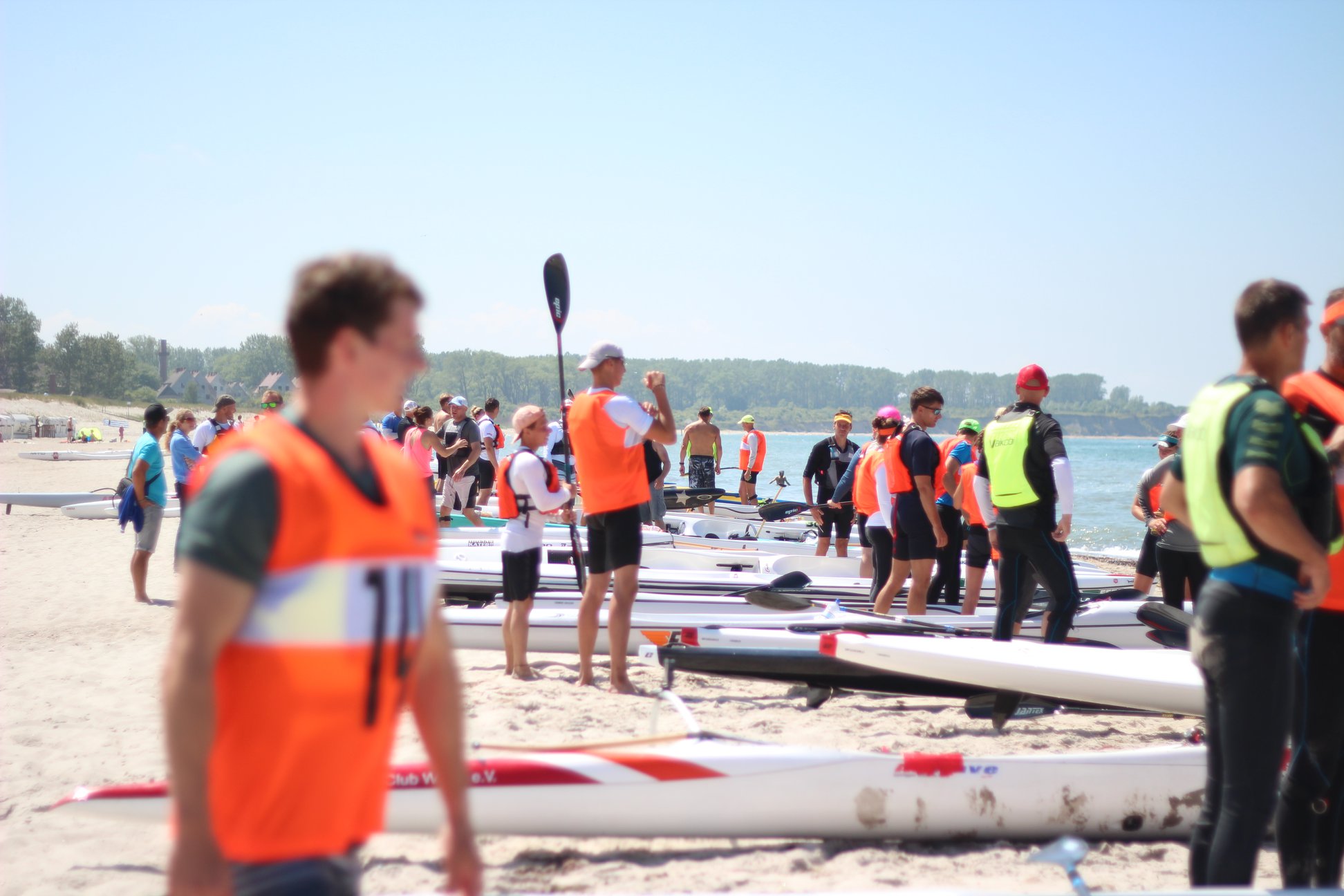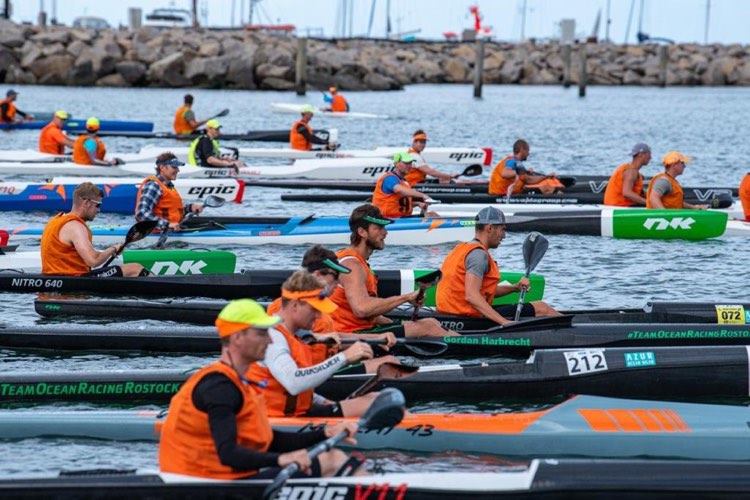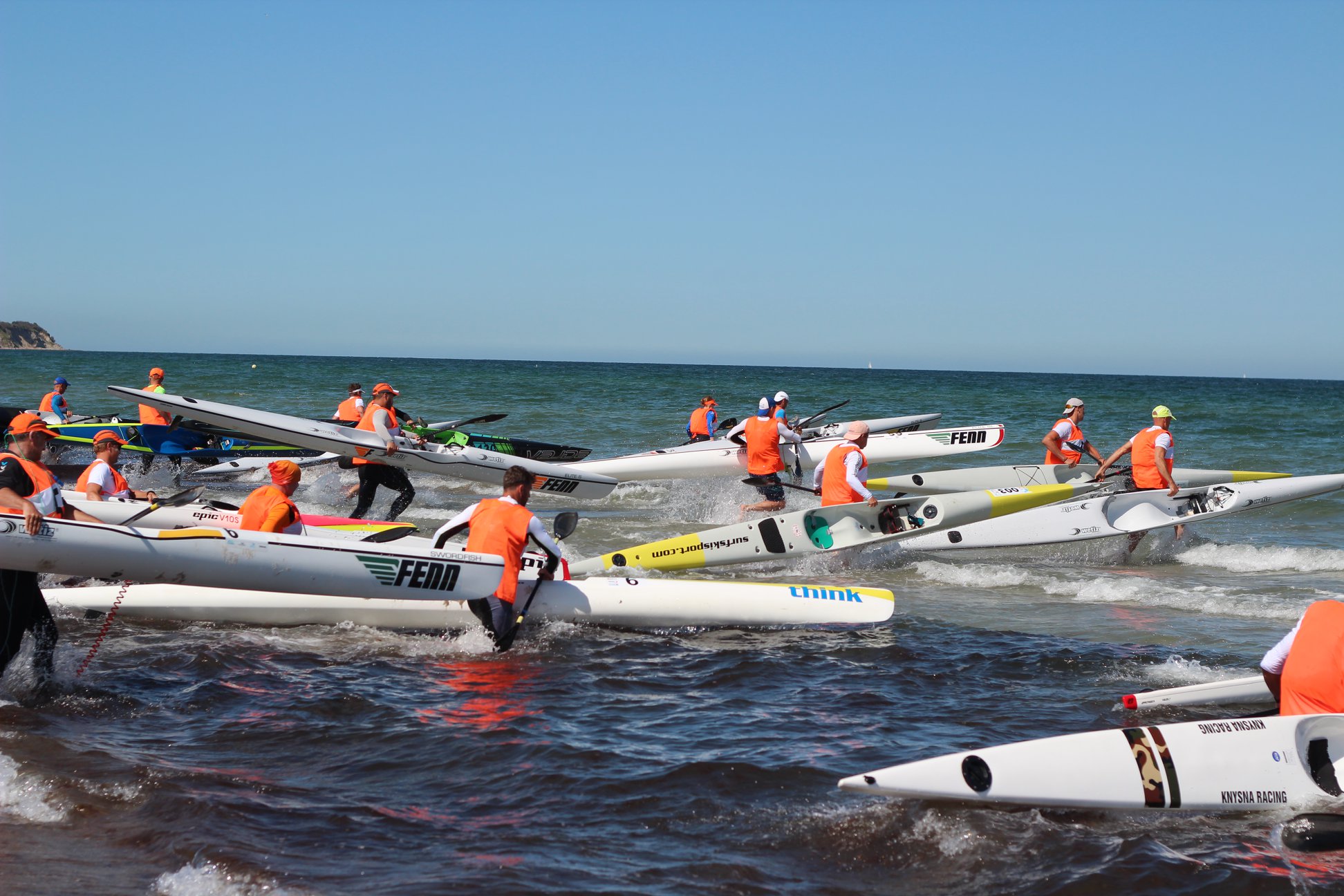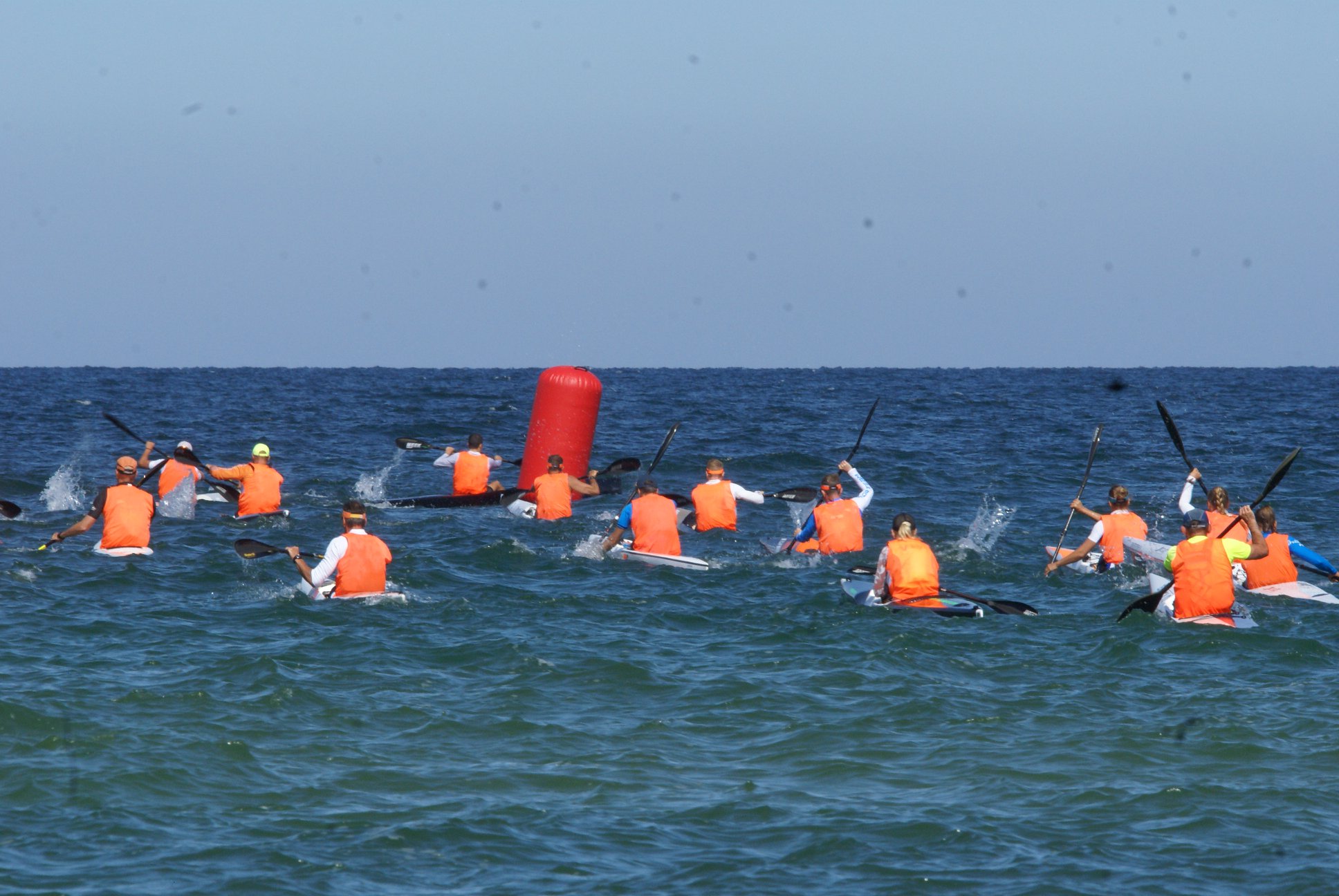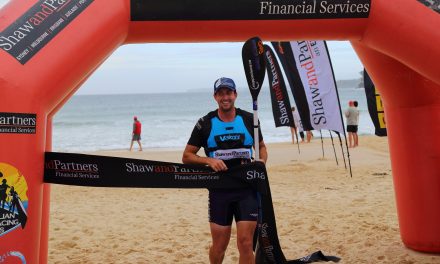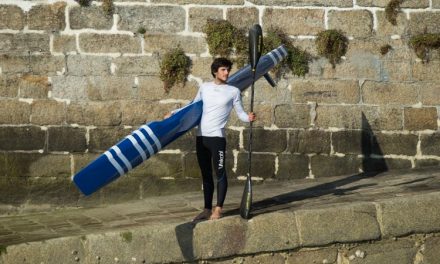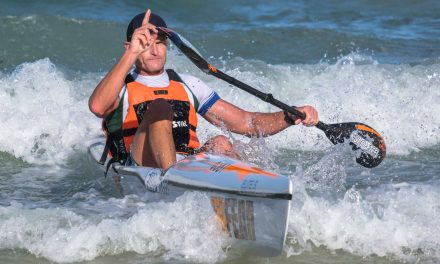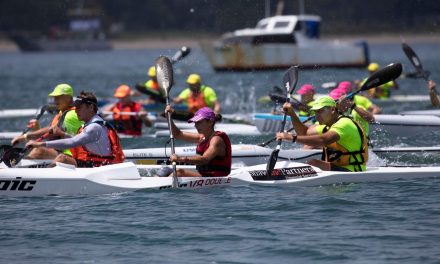SURFSKI SPOTLIGHT: GERMANY
10 years ago, Gordan Harbrecht barely knew what a surfski was.
Five years ago, he would brave the Baltic Sea – often on his own – as one of Germany’s few competitive downwind paddlers.
In June, he sat on the start line of a local race surrounded by 120 likeminded surfski lovers, pinching himself that it was happening.
Today, that reality-check is a daily occurrence.
“Everyday when I meet here with my friends,” he says. “It’s crazy and it’s awesome.”
“We have a beach life here in Germany. It may not be what you expect, but we live at the coast.
“We meet here for training then afterwards we chill at the beach and it helps the sport to grow.
“Sometimes people ask, ‘What is it you are doing? Surfing? Skiing?’ No, it’s paddling actually!
“But everybody likes it now and everybody knows it now.”
“It’s really building up here, and now we need to take the next steps.
For a country with such a rich paddling history in both sprint and marathon kayaking, it’s little surprise that the popularity of surfski is beginning to explode.
That is, of course, if you forget that the nation is largely landlocked and that the stretches of coastline that can get out on the open water must do so in the most extreme of conditions.
Although temperatures are bearable in summer, come winter, think near-freezing air temperatures and even colder water.
It’s enough to stop even the most enthusiastic paddler – except, that is, for any of the locals.
“It’s not too hard… in fact, it’s easy.” Harbrecht laughs. “You just wear the dry suit and then it’s no problem at all.”
“The only problem is that it’s more organisation because you need so many clothes.
“And then you must wash it, then dry it and there’s more things to carry to the session… but on the water, it’s easy.
“It’s always summer under the dry suit!”
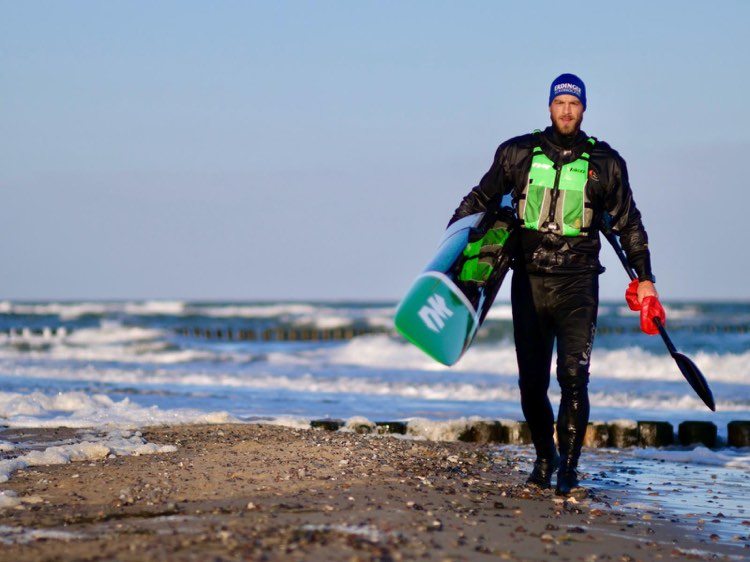
Gordan Harbrecht makes it sound easy, but paddling in the near-freezing waters of the Baltic Sea is no easy routine.
Today, Gordan Harbrecht is one of the best paddlers in the world.
In 2019 he finished second at the iconic Mauritius downwind race, second at the NELO Summer Challenge in Portugal, second at the lucrative Irish Coast Championships and seventh at the ICF World Championships.
But in 2015, he was one of Germany’s best sprint kayakers, a K4 1000 World Cup medallist vying for selection for the 2016 Rio Olympics.
Agonisingly, he missed out on selection.
According to many, unfairly.
“After I didn’t make it to the Olympics in 2016, it marked a change in my life,” he reflects.
“I had one year left in my mechanical engineering studies so I began paddling surfski next to that.
“I made quite good progress and suddenly had the chance to get a boat and some support for travelling.
“I got my flatwater friends into the surfski and taught them how to paddle downwind and do races – I experienced how nice surfski is and getting people into the sport.
“I don’t look back to my flatwater, honestly.
“I’m happy that I did it, but what we are doing here now is just so much fun.”
Admittedly, the transition wasn’t as easy at first.
Well, maybe it was at first.
In 2011, on a free weekend, Harbrecht heard about a lifesaving competition near his home and wanted to see what it was all about.
“The last race of the event was a long-distance one where they paddled about 20 kilometres and I asked if I could join in using a boat that was laying on the sand,” he recalls.
“I won this race because it was only paddling – no wind, no waves.”
“It was totally flat ocean!” he laughs.
Whether it was winning, or whether it was the excitement of a new discipline, there was something about paddling on open water that struck a chord with him.
A few months later, he was back for round two. But this time, powerful winds had whipped up waves more than a metre tall, crashing across the side of his boat.
“And I didn’t know what to do,” Harbrecht recalls.
“After a while I fell in the water and couldn’t get back in.
“Somehow when I eventually did, the leash was wrapped around the boat.
“Regardless, I really fell in love. This experience out there in the nature and the waves was so cool.”
Gordan still finished second on that day, only beaten by a man a few years his senior, who lives nowhere near the coast, named Michael Dobler.
“When I was new to surfski I thought, ‘how can this old man beat me?’” he laughs.
“But after a while I understood it’s really about using the waves.
“It’s not only hard work, you must also spend time on the ocean in different conditions as much as possible and also travel to different places to do this.”
Perhaps that’s Michael Dobler’s secret.
The now 51 year-old has lives in the land-locked city of Dusseldorf, yet for the past ten years has been a staple at downwind races around the globe.
And he recalls that race against Harbrecht, too… although perhaps a little differently.
“It was really funny, I remember it well.” Dobler laughs. “But let me start three weeks earlier.”
“[At that first race] He killed us! Even if his heavy, stable ski.
“I remember because I came second and said to him after the race, ‘That was really impressive, you really beat us. But in a proper downwind, the result could’ve been completely different.’
“He said, ‘Come on, I can paddle. There is not much difference between those conditions today and a proper downwind.’
“Well, three weeks later we had a proper downwind,” he chuckles.
“It was one of those races where you’re not sure whether the race director will cancel it or not.
“We had at least 25 knots of wind and big, big waves coming over the left shoulder, which made it quite tricky.
“Off the start Gordan went out like a rocket for the first kilometre. He was at least 150 metres in front of me, so I was able to watch him.
“He turned the buoy but couldn’t paddle straight, going almost directly back to shore.
“I was so sure I would be in front of him, I didn’t even look for him anymore.
“I paddled this 20-kilometre race and enjoyed the ride and got some nice waves – I didn’t even have to kill myself!
“I finished first and watched to see how far he would be behind me.
“I turned and was like, ‘No fucking way!’ He was directly behind me!
“And at the same time, he hadn’t seen me, and when he did he said, ‘No fucking way – you’re in front of me!’” he laughs.
“I think this was a good experience for Gordan because afterwards he realised that it’s not all about paddling.
“You need to learn how to surf properly.
“Since then, we’ve had a lot of training together and support each other and he improves year-by-year.
“Now he’s much, much stronger than me!”
It’s a hilarious yet valuable story.
Dobler’s surfski skills are as sharp as any of his contemporaries in South Africa or Australia and he’s won a deep respect from his contemporaries for it, right around the world.
It’s an achievement made even more impressive when you consider he lives three hours to the nearest sea – six if he travels to the north of Germany – as well as the fact that he didn’t sit in a surfski until he was 39 years old.
“I had never heard of it before,” he explains. “I was only paddling K1’s.”
“I wasn’t training that much at that time because of work… or maybe that was only an excuse, because I was getting bored of my training routine in the kayak.
At the time, my brother was around 135 kilograms and I said to him, ‘Come on Andreas, let’s go back to training. I’ll give you my old K1 and you’ll lose some weight immediately.’
“He barely fit into the kayak and after only paddling 500 metres it broke in two pieces!
“He was a bit mentally destroyed, thinking ‘I’m too fat for a K1, I can’t paddle anymore.’
“And I thought there must be another solution for my brother.”
That’s when he had a life-changing – and almost unbelievable – realisation.
Years earlier, when watching the 1980’s smash hit TV show Magnum P.I., he saw actor Tom Selleck kayaking on what Michael initially thought was a large surfboard.
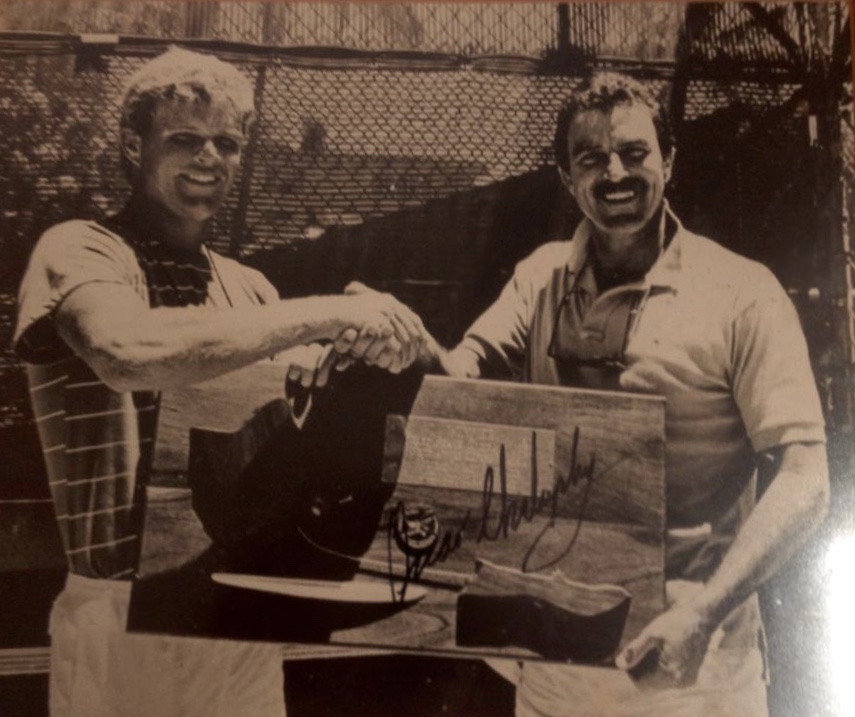
He’s won the Molokai Challenge 12 times, but surely one of Oscar Chalupsky’s greatest feats is teaching Tom Selleck to paddle.
“It was a sit-on-top kayak, and I thought my brother can’t destroy this!
“So I googled ‘Thomas Magnum’ and found a Wikipedia article which said that these boats are called ‘surfskis.’
“I found two brands – Epic and Fenn. I was amazed that there was an Epic dealer in Wuppertal, just 40 kilometres from Dusseldorf!
“I thought, ‘No fucking way! A surfski dealer close to my place and I had never heard of surfski before?!’
“I went for a test paddle with my brother and he was immediately stoked.
“He was paddling a V10 Sport and he fit in it like it was made for his butt!
“I was paddling a V10 and thought it was definitely a nice boat to paddle on the Rhine River.
With his history in competitive paddling, Dobler immediately wanted to race.
First up, the Euro Challenge in Alicante.
“I have to say, I was kind of arrogant.
“I thought, ‘I am 39 years old and I will show those paddlers how fast a German flatwater paddler can race in those surfskis!” He laughs.
“It took my only 15 seconds into the race for me to realise this is really competitive.
“But at that time, I became completely addicted.
“I realised it is a competitive sport and you need to be fit and you need to learn to surf waves.
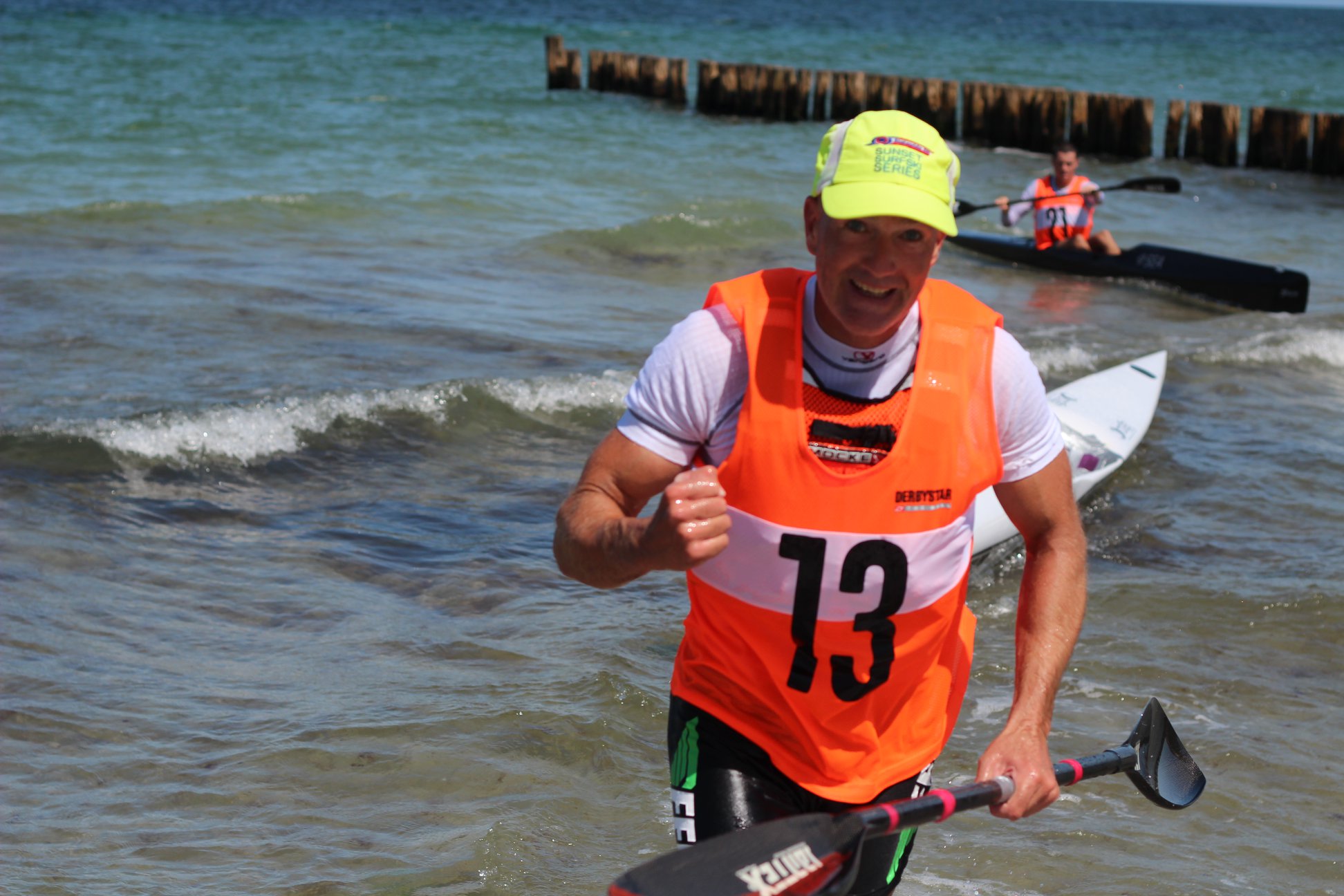
Michael Dobler on his way to another race win – and again, over much younger opposition.
In 2016, Harbrecht found himself on a similar path.
He was the first surfski paddler in his coastal town of Rostock and would often train on his own, or alongside his friend Maik Lojak.
“For lots of years it was only the two of us here,” he says.
“For races, lifesaving guys would join. Outriggers were quite popular 10 years ago and some of them began to join us, then some flatwater guys… now we have double the number of the outriggers in our surfski races.”
The explosion was rapid.
More and more paddlers began taking note, and before long, sessions were attracting a large crowd.
“Now, when we have good winds here, we have 30 to 40 people meeting here to go paddling on the ocean. It’s great.
“We have some races here – more paddling with friends than competitive racing – but we have more than 120 people on the start line.”
That’s the silver lining that Harbrecht has found in this post-COVID world.
A full year of racing internationally disappeared in a flash, but that meant he could spend the season paddling at home, helping to nurture Germany’s emerging surfski scene.
He could attend the national championships which traditionally clash with the Mauritius Surfski Week, and although they were ‘officially’ cancelled due to the pandemic, paddlers who had already booked their trip went anyway, safely getting on the water and enjoying the community spirit.
His career has also taken a surfski turn.
After joining the Nordic Kayaks racing team from Epic at the end of 2018, his engineering experience gave him a few ideas for modifications and improvements.
The end result? Amid increasing popularity, Gordan was able to combine his passion with his career.
He now works for Nordic in a full-time capacity designing their surfskis.
“It sounds pretty good, huh?” He admits.
“It’s turning what you love into your job – and that’s exactly how I feel.”
“It’s such a great opportunity and I have so many options and can decide which way I want to go.
“I love surfski paddling and I love kayak sports. For me, it was a good chance to create the best combination of paddling and engineering.
“Hopefully when we are back next season, I can decide if I want to continue racing and if I want more of it.
“But now I can also combine my technical background of how a boat or a paddle must look to be fast, with my experience behind it.
“It’s actually quite a lot of work and I need to find which way is best for me. But these experiences are super, super good and I’m super happy to be able to do it.
“It’s so nice to be involved in the process from the very beginning – to designing it, to paddling it and then seeing how it feels and showing it to your friends.”
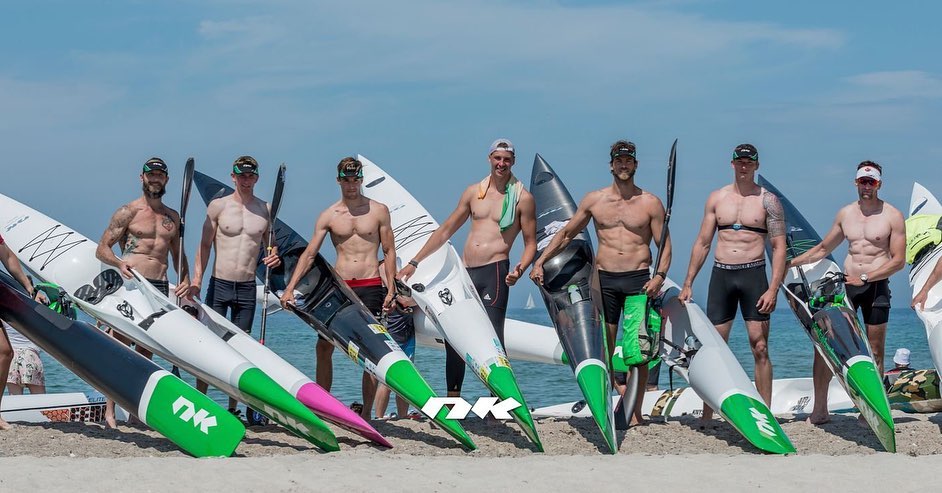
Surfski is spreading across Germany, and with Harbrecht at the helm, so too is Nordic Kayaks.
With Harbrecht’s influence and status within the German surfski community, Nordic Kayaks has risen to prominence.
But Epic, Fenn, Vajda, Think and Stellar are all active across a range of boat models, helping to drive the sport forward.
“We are all working to get new people into the sport because that is the key to the future.” He says.
And that future is bright.
While participation numbers are exponentially rising, so too is the quality of paddlers at a competitive level.
It’s no longer Harbrecht and Dobler flying the flag on their own.
Claas Gebhard, Martin Schubert and Franz Polchow are all strong emerging Under 23 paddlers who are quickly adapting to the ocean, while Nordin Sparmann is one of many to discover the sport through surf lifesaving.
“It will continue to grow, of course, and get even more competitive,” Harbrecht says.
“The fast flatwater guys know now about surfski and some have already asked me to come to my house for a holiday to learn about it.”
Among them, Olympic champion Max Hoff.
The sprint kayak legend is a close friend of Harbrecht’s and recently visited him in the north to spend time in the surfski.
“Max enjoyed his time in the sea here and checking out our training group, which has very mixed levels of skills.” Harbrecht says.
“For the other guys it was quite cool to paddle with an Olympic champion and it was really good to have him here.
“His plan was to get some waves in the ski, but unfortunately there were no waves or wind at all.
“We were able to have some flatwater sessions on the ski.
“He is really fit, and at the moment i’m not, so he was really fast!”
To have a sprint kayaker of Hoff’s stature want to improve his ability in the surfski is a clear sign of the way the discipline is gaining traction and respect within the German paddling community.
“You will see faster guys next year too.”
“The next step is some more training with the kids organised through the clubs here.
“We will see more youngsters in the sport over the next few years.”
“But until now the Federation just don’t mind at all. We don’t have a budget for the World Championships and have to pay everything ourselves. It’s not Olympics, so we don’t get money.
“But I think it’s a big mistake. It’s a big chance for sport in general.
“Now in Europe surfski is a big trend. It’s not so easy to motivate youngsters for flatwater paddling. But to combine each area – flatwater kayak racing, surfski and maybe even SUP – is a big chance for our sport to grow in general.
“It will change paddling in general if the Federations can become involved.
“And if not, we will continue to grow anyway.”
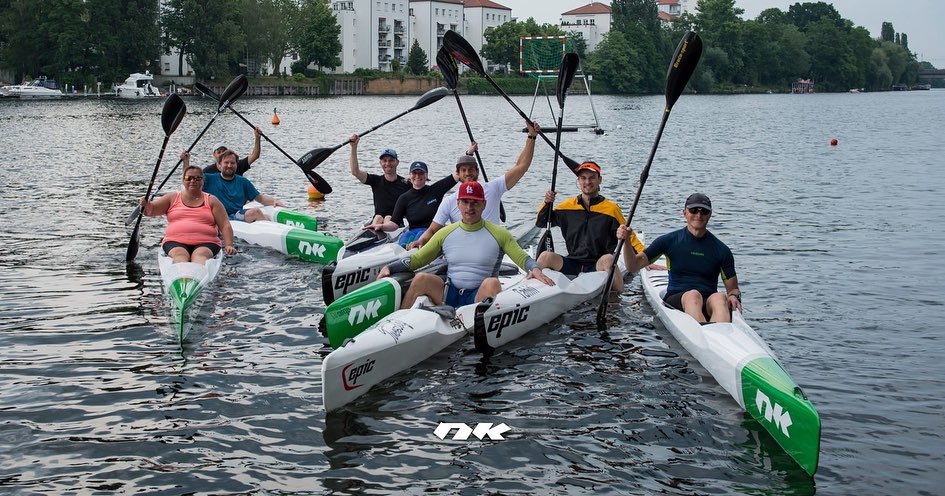
Dobler agrees, but he sees the true growth potential away from the start lines of events.
“When I started in 2009, I was the only guy in Dusseldorf with a surfski.” He recalls.
“Now, there are 30, 40 or 50 just in Dusseldorf alone – bur you’ll never see them at a race.
“The community is growing, but they’re just ‘convenience’ paddlers – most do it for a bit of adventure.
“I think the sport has big potential in Germany, but not only to bring paddlers from racing kayaks to surfski, but also to see the whole paddle community grow.
“You can do a lot of fun races in the ski. You can go to Switzerland and have a marathon race on a lake there, or a river marathon… surfski paddling isn’t just on the ocean.”
As an engineer, Gordan Harbrecht is used to problem solving.
And after plenty of trial and error, training and racing… he has finally cracked the code.
“There is no secret to paddling fast – you just need to get your arse into a ski and on the ocean!” he laughs.
“The South African and Australian guys don’t necessarily do special things – they are just used to it.
“Now I feel that more and more people here in Europe are doing the same.”
